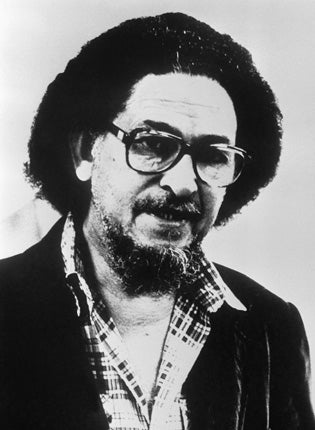Poet who battled apartheid dies at 85
Banned in South Africa, Dennis Brutus kept up the fight from exile in the US

Of all the ways that South Africa's celebrated poet activist Dennis Brutus might have died, to depart peacefully in his sleep at home in Cape Town seemed the least likely.
The veteran of the anti-apartheid struggle, whose Robben Island cell was next-door to Nelson Mandela's, was still active after turning 85. With his trademark long white hair and beard, he was a relentless campaigner on climate and apartheid reparations, even as he battled prostate cancer.
The poet came closest to being killed 46 years ago, when he was shot in the back attempting to escape police custody in Johannesburg. The life-long trade unionist and labour activist nearly died outside the Anglo American Corporation headquarters while waiting for an ambulance reserved for non-whites to arrive.
Age did little to mellow the former political prisoner, who dedicated much of this past year to campaigns including: calling on protesters to cause a "lockdown" at the Copenhagen climate talks; calling on African leaders to walk out of the summit rather than compromise; and publicly questioning the value of South Africa's hosting of next year's World Cup.
Born in what is now Zimbabwe to parents who were both South African teachers, he moved back to his native country while still a boy, going on to win a full scholarship and becoming a teacher himself. He first achieved prominence with a campaign to boycott the all-white sports bodies, setting up the alternative South African Sports Association.
This led to him becoming a "banned person" in South Africa in 1961. He was arrested in 1963, and after being released on bail escaped across the border to Mozambique. However he was later deported, leading to the attempted escape and near death. In 1964, he achieved his sporting goal by getting the International Olympic Committee to expel South Africa.
His first collection of poetry was published while he was still in prison. Sirens, Knuckles and Boots was printed in Nigeria as he was forbidden to teach, write or publish at home. His writing was celebrated for its lyrical intensity and his earlier works for their narrative complexity, although some critics found his later political works akin to sloganeering. Among the best known of his prison poems is "Somehow We Survive", in which he wrote: "All our land is scarred with terror/rendered unlovely and unlovable/sundered are we and all our passionate surrender/but somehow tenderness survives."
In 1966 he was forced to flee South Africa and began what was to become a lengthy legal battle to remain in the US. The arrival of the Reagan administration brought changes in the status of political refugees and he fought deportation from the US for two years until winning asylum in 1983.
By now a literature and African studies teacher at Northwestern University and the University of Pittsburgh, Brutus had turned his considerable energies latterly to rallying opposition to climate change. Until he was unbanned in 1990, only one of his books escaped the South African censors – Thoughts Abroad, published in 1970 under the pseudonym John Bruin. Latterly he returned to South Africa, taking up an honorary position at the University of KwaZulu-Natal.
He reminded South Africans of his fiery commitment two years ago when he publicly snubbed the nation's Sports Hall of Fame, stating: "It is incompatible to have those who championed racist sport alongside its genuine victims. It's time – indeed long past time – for sports truth, apologies and reconciliation."
The poet was instrumental in efforts to get corporations to pay reparations to black South Africans for profits made under the apartheid system. His concern with what he called "climate catastrophe" was in evidence at one of his last public appearances, an award ceremony in September where he read from his poem, "Gull": "Gull gliding against/grey-silver autumn sky/sees a vast miasma of greed slowly encompass our entire planet."
Subscribe to Independent Premium to bookmark this article
Want to bookmark your favourite articles and stories to read or reference later? Start your Independent Premium subscription today.

Join our commenting forum
Join thought-provoking conversations, follow other Independent readers and see their replies